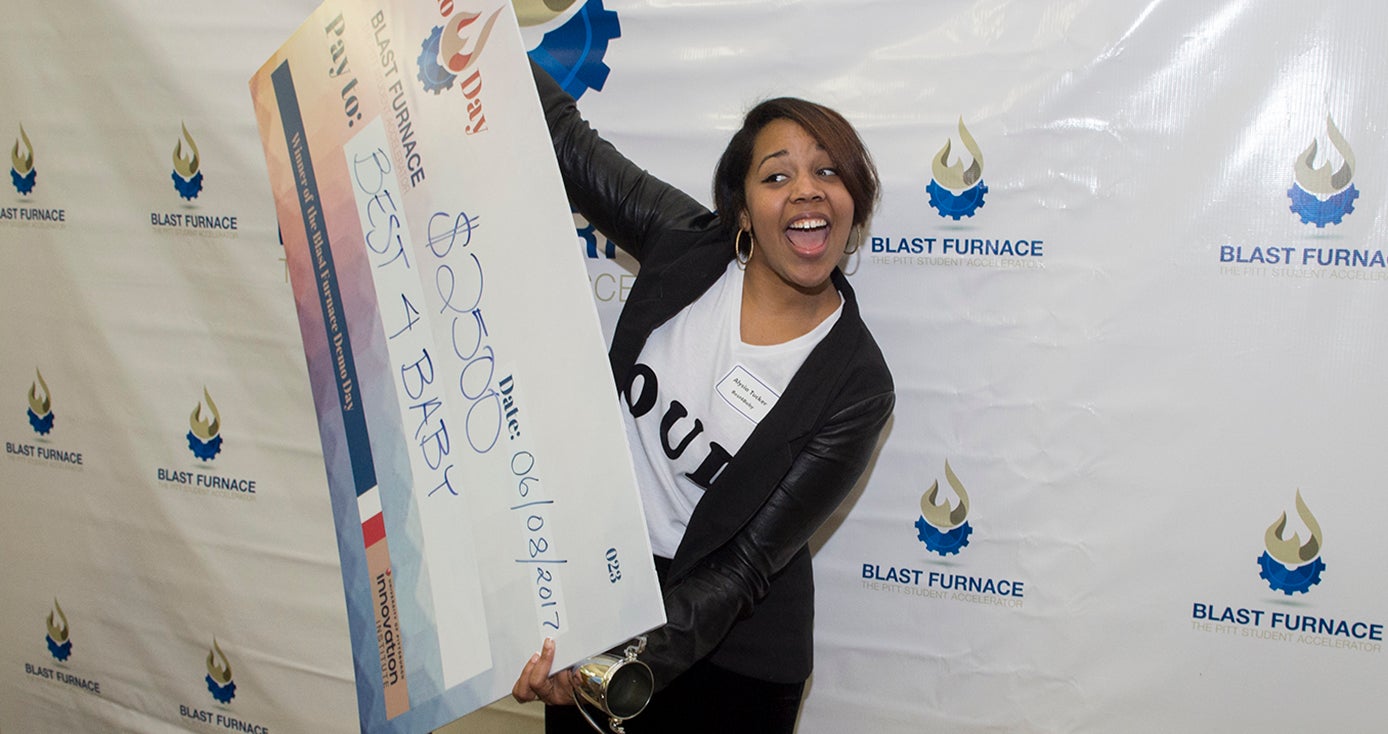
Subscribe to Pittwire Today
Get the most interesting and important stories from the University of Pittsburgh.Online Service Aiming to Match Moms-to-Be With Doulas Wins Student Pitch Competition
Alysia Tucker spent two years helping women during and after childbirth in her role as a doula — and the experience gave her an idea.
She said many mothers wanted to hire a doula, a professional who provides educational and physical assistance throughout, during and after pregnancy and childbirth. But often, she said, they had difficulty finding one who fit their needs. So, with the help of the University of Pittsburgh Blast Furnace, she developed an online service to bring expectant mothers and doulas together. Her idea earned first place at the Blast Furnace’s Demo Day in June.
Tucker, a student in Pitt’s Graduate School of Public Health, is one of about 70 students who spent 10 weeks with the Blast Furnace learning how to take ideas from inspiration to commercialization. For Tucker, the culmination of the program was delivering the winning pitch for Best4Baby. The $2,500 prize will go toward creating the service’s online platform and piloting the program in Pittsburgh, she said.
“I guarantee you will think differently about the world once you have witnessed the birth of a new life,” said Tucker. She said her experiences inspired her “to create Best4Baby to make sure [women] get connected with what they need. Finding a doula and one that fits within a family’s budget is a barrier to obtaining services.”
Best4Baby works as a matchmaking service for doulas and expectant mothers. The goal is twofold: help women find and vet local and affordable doulas in their area more quickly and easily, and assist doulas by providing information on the mothers they are paired with. Additionally, Tucker, who is pursuing her Master of Public Health with a concentration in behavioral and community health sciences, plans for Best4Baby to provide business support to doulas and doula agencies.
“Being able to be with a mom for such an intimate experience, it really just changed my life,” said Tucker.
This year’s Demo Day saw a record 21 student teams give 60-second pitches for their products and services to a panel of judges consisting of local entrepreneurs and an audience of potential startup investors. All teams were required to include at least one Pitt student.
Five teams, four selected by judges and one voted in by the audience, advanced to the final round. The finalists gave three-minute presentations and answered questions ranging from details about their products and services’ capabilities, to what their business models looked like.
Second place went to Four Growers, a company headed by Pitt student Daniel Chi and 2017 Pitt graduates Brandon Contino and Cameron Beichner, all of the Swanson School of Engineering.
The trio conceived the idea for a tomato harvesting robot that would save money in labor costs and help prevent the spread of diseases among tomato plants in hydroponic tomato greenhouses. The group received $1,000 for its efforts.
Third place honors went to OxyGen, a team consisting of Pitt School of Medicine student James Newton, Pitt graduate Sushrut Bhalerao (ENGR ’17G) , Johns Hopkins School of Medicine student Wendy Zhang and Carnegie Mellon University engineering student Ashwin Prabhu.
The four developed a mechanically powered device that creates supplemental oxygen for use in developing countries where hospitals don’t have the resources to provide oxygen to babies, especially important for those with respiratory illnesses such as pneumonia. The team received $500.
Furnace director Greg Coticchia said the program has had more than 300 students and 80 teams since April 2015.
“They’re doing this because they want to,” Coticchia said. “There are no credits involved. They’re giving 10 to 15 hours a week of their time to bring their ideas to life.”


